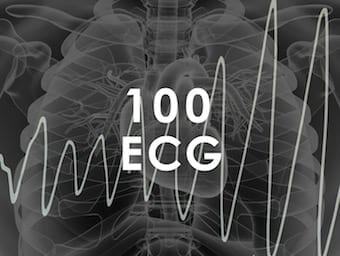
Killer ECG Patterns: Part 1
The average Emergency Clinician is interrupted every 6 minutes. When busy, it can be tempting to quickly “sign off” an ECG. These are the patterns not to miss.

The average Emergency Clinician is interrupted every 6 minutes. When busy, it can be tempting to quickly “sign off” an ECG. These are the patterns not to miss.

Can you predict this patient's potassium? Patients with this syndrome may not exhibit the typical ECG features of hyperkalaemia beyond bradycardia

This ECG is from a 35 yr old male Type 1 diabetic. He presents feeling generally unwell with abdominal pain and dyspnea. Interpret the ECG

Physiology Philes: Draw a normal ECG tracing showing the durations of the major intervals and the effects of hyperkalemia. BSCC Examination question

84 year old male presents complaining of general lethargy, nausea, several episodes of diarrhea, and dizziness. Describe and interpret this ECG.

44 year old male with a history of non-complaint Type 1 diabetes. He has been found at home in a semi-conscious state. Describe and interpret this ECG. LITFL Top 100 ECG

An 83 year old man with a past history of Type 2 diabetes, hypertension and ischaemic heart disease has become progressively unwell over the last 5 days. His GP discovered a pneumonia on CXR and has been treating him with oral antibiotics for the last 3 days but his clinical condition has continued to worsen.

Hyperkalaemia is a life-threatening emergency. Basic overview of hyperkalemia management

Overview Causes Increased potassium intake (rare) Increased release from tissues Decreased renal excretion Transcellular shift Factitious (Pseudo-hyperkalaemia) Drugs causing hyperkalaemia References and Links LITFL

George is a 72 year old male found collapsed at home on floor of his bedroom, incontinent of urine and faeces. He complained of significant pain in his right hip with shortening and rotation.

Clinical Cases Hyperkalaemia DDx Hyperkalaemia management Hyperkalemia Case Study Causes of HYPERkalaemia Serum potassium levels above the normal range (3.5-5.0 mmol/L) 1) Increased potassium intake (rare) Oral (potassium supplements) IV (transfusion of stored blood, supplement infusions) 2) Increased production Tissue…

Elderly patient presenting with collapse. Clinically dehydrated. Describe and interpret this ECG. sine wave, peaked T waves, hyperkalemia